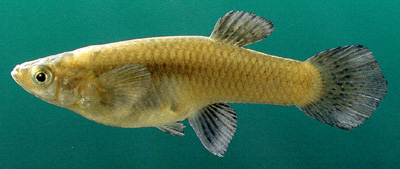Mosquito Fish
Category: Pond Fish

Facts about Mosquito Fish. "Scientific name for Mosquito Fish is Gambusia complex (G. affinis and G. holbrooki)". The Mosquito Fish can consume large quantities of mosquito insect larvae in your pond, this is very big advantage of having the Mosquito Fish in a pond. Introduced into California as early as 1922, they have been one of the most effective non-poison and non-chemical methods to help controlling mosquitoes for over eighty years. Most backyard ponds that are interested in use of these group of Gambusia (Gambusia is a large genus in the fish family Poeciliidae and is related to the common guppy and very similar in characteristics. (Cyprinodontiformes is a ray-finned fish, consisting mostly of small, fresh-water fish).
Gambusia include over 40 groups, most of them are usually found in freshwater places where they live. Though some groups may also be found in slightly salty or saltwater places where they are living.
Mosquito fish are smaller than most other fish, their body is long and slender and pale in color, with female Mosquito Fish becoming to be about a length of 2 7/8 inches (7 cm) and males becoming a length of 1 5/8 (4 cm). You can tell the female Mosquito Fish from males, is by their size and a big spot at the back of their belly. Their name says mosquitoes, also the Mosquito fish are very hungry and will consume other insect larvae and algae to benefit your pond in many ways. Filamentous algae, this may indicate an excess of organic debris. If it gets too thick the fish may not be able to get to the mosquito larvae. Small amounts, can be a good food source for the fish and shelter for the fry.
The Mosquito fish really helps your back yard, to not become mosquitoes-ville. They also help keep your pond beautiful by feeding on hatching insects and algae that can destroy pond plants and the beauty of your water garden or pond.
Most Mosquito Fish have a tail of conservative size, with very little color. different types of Mosquito Fish can be found freely as far north as Illinois. Most Mosquito fish can survive harsh, freezing winters as long as the pond is deep enough and well aerated during the cold winters.
Mosquito fish do not lay eggs, but rather give birth to live young. They breed in the summer and new births of fry are produced at intervals of about six weeks. The environment should have a covering of floating plants or a breeding top to protect the fry. Adults may eat the fry if left without a good place to hide.

 Back To Category Pond Fish
Back To Category Pond Fish